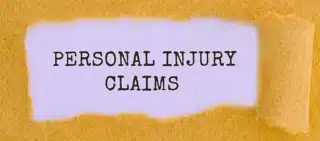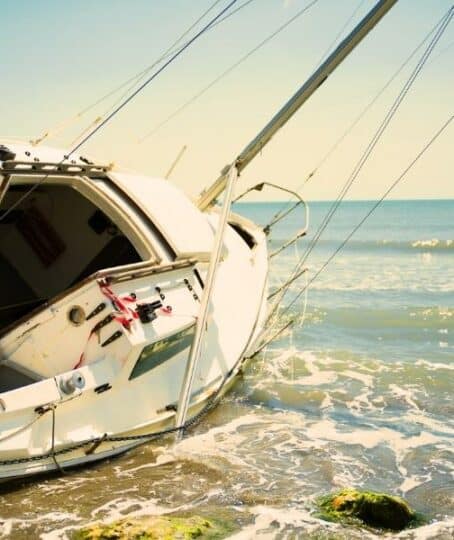
Overview of the Personal Injury Claim Process in Illinois No one expects to suffer an injury or get involved in...


If you were in a boat accident, you can file a boating accident lawsuit if that party’s negligence contributed to your injuries. Your boat accident lawyer will evaluate the cause of the crash to help determine the right party or parties to sue. For example, the owner of the boat is not always the person who was operating the boat when the accident happened and might not have been negligent. However, the owner could still be liable if he or she consented to let the other person drive the boat.
Also, Illinois law does not require boat owners to carry liability insurance. Insurance companies usually have more resources for paying injury claims than individual people. Other sources of recovery may be available if the boat’s owner did not have liability insurance, however.

You can file a boat accident lawsuit if someone’s negligence or reckless behavior caused your injuries. A boat accident lawyer evaluates your situation and determines if you have the elements present for a successful claim. Four elements must be present to make a case.
1. Duty of care: Watercraft operators owe a duty of care to one another and to the people on waterways. Operators have the responsibility to refrain from unsafe behaviors that could harm others on the water.
2. Failure in the duty of care: Boat operators fail in their duty of care with behaviors such as excessive speeding, boating under the influence (BUI), recklessly losing control of the boat, and not leaving room for other vehicles on the water.
3. Causation: The boat operator's behavior must have resulted in the accident. For example, if the operator had not been speeding, the accident would not have happened.
4. Damages: Medical costs, lost wages, prescription medications, pain and suffering, and property damage are examples of damages you might sue for if you file a lawsuit for boat accident injuries.
Suing the owner of the boat for your losses may not be the only remedy. You may be able to sue a passenger on the boat who acted recklessly or interfered with the operator’s safe navigation, the boat’s manufacturer if a defect played a role in the accident, or the boat rental company if it did not properly maintain the boat or fix maintenance problems.
Illinois has its share of waterways that are host to countless boating accidents every year. Boating accidents occur on Lake Michigan, the Illinois River, the Mississippi River, and various lakes and rivers. Further, it is possible that claims could be made under common law negligence, the Jones Act (Merchant Marine Act), or the Longshore and Harbor Workers’ Compensation Act. Your boat accident lawyer will help you figure out which paths to navigate.
Liability after a boat accident is not always clear-cut. You must show that your injuries stemmed from someone's negligence, and not all boat injuries occur from negligence. For instance, if the boat you were on hit a wave or another boat's wake, and you suffered serious injuries from the impact, that could be negligence (or not) depending on the circumstances. Factors like whether the operator was looking out for hazards, whether the operator was under the influence of drugs or alcohol when the accident happened, and whether another boater intentionally caused the accident.
The other boat's operator could be negligent in a wake situation, too. That applies if the boat was driving in a no-wake zone or twisting recklessly through crowded areas and leaving a large wake.
Other factors relating to the operator of your boat having liability include whether the operator let passengers know the boat was getting close to a wave or wake, the speed of the boat, the visibility of the boat, boat traffic in the area, and whether you were on a sailboat or motorboat. When a motorboat and sailboat collide, the motorboat is typically more at fault because safe boating guidelines mandate that motorboats steer clear of sailboats.
Liability can be more clear-cut in situations where the boat does not have life jackets, flares, fire extinguishers, and other types of safety equipment on board. In these cases, lawyers often bring claims of negligence against the boat’s owner and operator (along with possible other parties).
The lack of safety gear may have played no role in the accident, but it probably did hinder rescue efforts. For instance, a life ring makes it easier to get someone who fell overboard back on the boat. Similarly, whistles and flares let passengers summon help if a boat is disabled.
Liability can go either way if the boat operator collides with a fixed object. That is true even if the weather and visibility are optimal. If the operator is motoring along rapidly in heavy fog, not consulting nautical charts, not using GPS, and collides with a rock, that is negligence. However, if the operator is steering the boat at a reasonable speed for fog and is using charts, and hits a rock, the case for negligence is not as clear.
When two boats collide, both boats’ operators typically share fault. Passengers could have a case against both operators. If an operator is injured, he or she could have a case against the other operator if the injured operator is less than 50% responsible for the accident.
How much to ask for in a personal injury settlement depends on economic and non-economic losses, the other parties’ insurance policy limits, and other factors. The rule of thumb is to ask for an amount a little higher than the amount you would be satisfied with. It is also reasonable to ask for up to three times the amount of your medical costs, but not more. Whatever amount you ask for, it should be sufficient to completely cover your current losses and damages, and any future medical bills and lost wages as well.
Your boat accident lawyer will consider the following when determining the value of your case.
The severity of your injury plays a significant role in your financial recovery. Catastrophic injuries tend to have the highest settlement or jury award amounts. They include traumatic brain injury, serious spine injuries, and permanent disfigurement or disability.
Common damages in boat accidents include medical expenses, lost income, lost future earning capability, and pain and suffering.
If you suffered severe injuries, your medical expenses are likely significant. A lawsuit can help you pay for expenses related to ambulance rides, emergency treatment, doctors' fees, medications, and ongoing treatment. Lost income can factor into your injury claim as well. You will also need to calculate wages lost from missing work as well as lost income from bonuses, promotions, and the like.
Lost future earning capability could be a factor if you are unable to resume working in the capacity you did before the boat accident. Your boat accident lawyer may consult with a vocational expert to help you prove you are unable to work. Your past earnings will also play a role in this amount.
Pain and suffering can be tricky to quantify. They are more of a factor if the injury and its effects are severe. In addition to your physical pain and suffering, you could receive damages for mental and emotional trauma, especially if you have treatment records from a mental health professional.
The other party’s insurance policies and coverage limits will play a significant role in your settlement or jury verdict award. If the person you are suing does not have boaters' liability insurance or assets, he or she lacks the resources to pay damages. Fortunately, other recovery options may be available. For instance, you may have a case against a boat manufacturer, a mechanic, or the manufacturer of lifesaving equipment. Your own health insurance may help pay for some of your medical bills. If you were on a charter boat when the accident happened, or a charter boat hit the boat you were on, you may be able to sue the company. Car insurance does not cover boating injuries, although the other party's homeowner's coverage might help in some circumstances.
The chances of winning a personal injury lawsuit depend on how clear the case is for the other party's negligence, whether there might be any negligence on your part, the state law where the boating accident occurred, and the experience of your attorney in personal injury or boating accidents. In Illinois, the modified comparative negligence standard applies. It means plaintiffs can seek compensation if they are less than 50% at fault.
Other factors affect the chances of succeeding with a claim. For example, if you sought medical attention right away, that helps immensely. It establishes documentation for a clear cause and effect and indicates that you had injuries. You must also follow medical advice and be attempting to recover in good faith. If you are not taking medications or attending physical therapy, the other party can argue with more effect that your injuries are worse because you failed to follow medical recommendations.

Overview of the Personal Injury Claim Process in Illinois No one expects to suffer an injury or get involved in...

Exploring Caps on Damages in Illinois Personal Injury Cases Illinois does not have laws capping damages in successful personal injury...

For one of the top Peoria law firms to manage your case, contact Strong Law Offices at (309) 688-5297. Top...